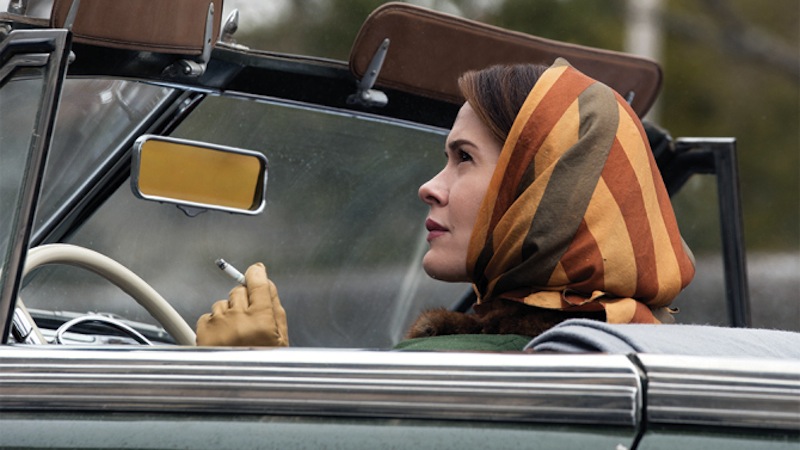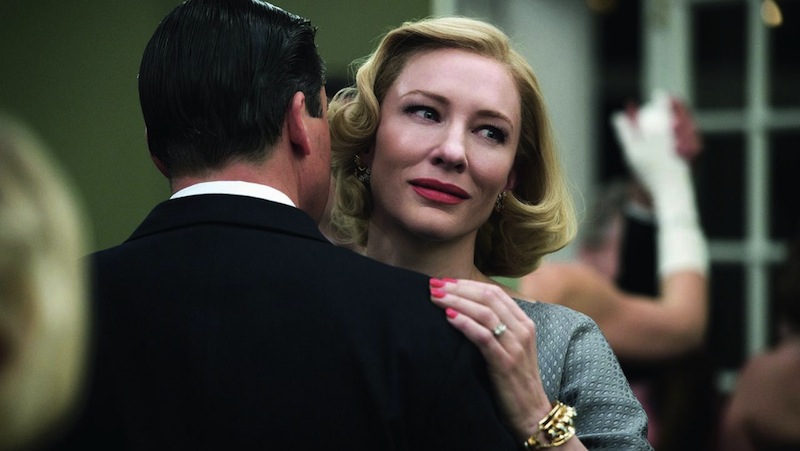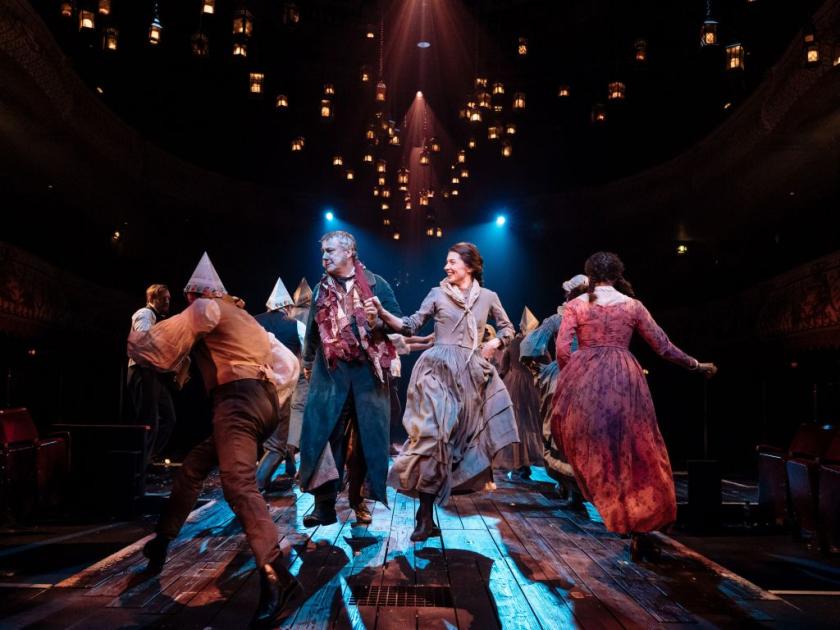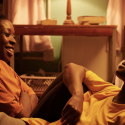New York, in the early 1950s. Twenty-something Therese Belivet is working in a Manhattan department store at Christmas, wearing a Santa hat and dutifully trying to overcome her boredom. Then Carol Aird strides into view – classy, confident, patrician Carol, archly eyeing the shop girl and nonchalantly buying the most expensive toy on offer, before leaving her gloves on the counter behind her. Therese’s life is about to change dramatically.
The director Todd Haynes not only tells stories set in the past, notably in America between the Thirties and Fifties, but he also makes films that feel as though they’ve been beamed directly from that period, in the best sense. Far From Heaven, the TV series Mildred Pierce and now the glorious Carol rekindle the spirit of an age when “women’s pictures” were commonplace in Hollywood, telling female-centred, taboo-breaking stories, featuring exceptional actresses such as Barbara Stanwyck, Joan Crawford and Bette Davis, whose characters face obstacles – prejudice around race, class, gender – that are no less prevalent today.
Let’s face it, how many films anywhere close to the mainstream involve a lesbian love story that is given the full-blown and sincere exposition of the most captivating and heartbreaking romance? In that sense, Carol offers a female equivalent to Ang Lee’s Brokeback Mountain. It may be just as good.
The director has a knack for casting the very best actresses around
The film is adapted from the romantic novel The Price of Salt, an early and atypical work by Patricia Highsmith, whose forte was such psychological thrillers as The Talented Mr Ripley and Strangers on a Train. The fine screenplay is by Phyllis Nagy, though the film feels very much Haynes’s, shot through with his empathy and visual grace.
The director also has a knack for casting the very best actresses around. There was Julianne Moore in Safe and Far from Heaven, Kate Winslet in Mildred Pierce. Here, Cate Blanchett is Carol, the upper-class woman whose marriage is already on the rocks when she meets Rooney Mara’s Therese, whose lowly role belies her self-awareness and ambition to be a photographer. Both are sensational.
Once Therese has returned the gloves, Carol instigates an acquaintance that both women, at least subconsciously, know to be the prelude to a love affair. “You’re a strange girl… flung out of space,” the older woman muses, as they share their first lunch. Opposite her, Mara performs a quite brilliant jolt in her chair, as though her character is trying literally to rise to the occasion, Therese mimicking Carol’s order, almost eagerly out of her depth.
 They are different in age, class, wealth and experience. Carol has already had at least one lesbian relationship, with her best friend Abby Gerhard (the excellent Sarah Paulson, pictured right), which we’re led to assume widened the cracks of her marriage to Harge (Kyle Chandler), the pair now clinging to civility because of their daughter. Though she hates the socialite swirl, Carol is effortlessly the most dazzling within it. In contrast, Therese’s sexual experience is negligible and she’s indifferent to her amiable but doltish boyfriend, their only thing in common being that they're among the legion of young people excitedly finding their way on the lower rungs of the metropolis. Therese is a naïf, eager for new experience. At one point she chastises herself: “How can I know what I want, when all I ever do is say yes to everything?” But that’s not a bad way to be. And in Carol, Therese has found someone who will push her towards self-knowledge.
They are different in age, class, wealth and experience. Carol has already had at least one lesbian relationship, with her best friend Abby Gerhard (the excellent Sarah Paulson, pictured right), which we’re led to assume widened the cracks of her marriage to Harge (Kyle Chandler), the pair now clinging to civility because of their daughter. Though she hates the socialite swirl, Carol is effortlessly the most dazzling within it. In contrast, Therese’s sexual experience is negligible and she’s indifferent to her amiable but doltish boyfriend, their only thing in common being that they're among the legion of young people excitedly finding their way on the lower rungs of the metropolis. Therese is a naïf, eager for new experience. At one point she chastises herself: “How can I know what I want, when all I ever do is say yes to everything?” But that’s not a bad way to be. And in Carol, Therese has found someone who will push her towards self-knowledge.
Society will have its say, of course; the film is in many ways an archetypal love story, albeit girl meets girl, girl loses girl…, which works on one’s emotions in myriad ways as it unfolds. Carol’s domestic predicament plays in tandem with the romance, providing the film’s drama and offering up one of its most moving aspects, which is Carol’s remarkable strength and resolve, as she determines “not to live against my grain”; she's tragic in the way that only fiercely independent people can be. Blanchett gets better and better as the film progresses, until she’s simply heartbreaking.
 Haynes bookmarks the plot with a device borrowed from cinema’s most famous weepy, David Lean's Brief Encounter. Here, a meeting between Carol and Therese in a restaurant is rudely interrupted by a loud friend, prompting Carol’s departure; the film then casts back to the start of their story, returning in due course to this opening scene and what appears to be the end. As well as an apt homage, it’s a typically elegant narrative move, reflecting the judgement and restraint throughout the film. The period is nicely captured – though never heightened – by Edward Lachmann’s grainy, shallow-depth Super 16 photography, while much of the mood-setting is achieved by Sandy Powell’s wonderful clothes and Carter Burwell’s soundtrack, which is reminiscent of Philip Glass’s spare but highly emotive piano pieces.
Haynes bookmarks the plot with a device borrowed from cinema’s most famous weepy, David Lean's Brief Encounter. Here, a meeting between Carol and Therese in a restaurant is rudely interrupted by a loud friend, prompting Carol’s departure; the film then casts back to the start of their story, returning in due course to this opening scene and what appears to be the end. As well as an apt homage, it’s a typically elegant narrative move, reflecting the judgement and restraint throughout the film. The period is nicely captured – though never heightened – by Edward Lachmann’s grainy, shallow-depth Super 16 photography, while much of the mood-setting is achieved by Sandy Powell’s wonderful clothes and Carter Burwell’s soundtrack, which is reminiscent of Philip Glass’s spare but highly emotive piano pieces.
It’s a film that justifies repeated viewing, each time a new detail underlining its resonant depiction of love as an adventure, whether it be the pleasure of selecting a gift that will remind the other of an early encounter, or the frisson of difference represented by three white, perfectly scaled-down suitcases alongside a solitary, ordinary yellow one. But the ending will be the same with each viewing, the same tension, the same longing, our willing each time a certain conclusion as though we have lived the story ourselves.
Overleaf: watch the trailer for Carol














Add comment